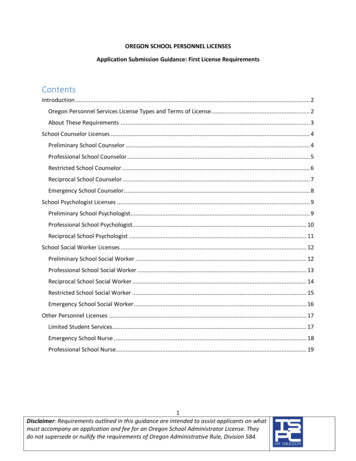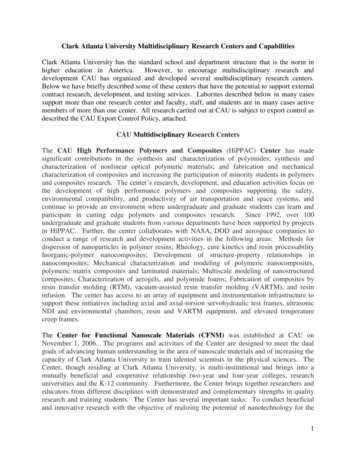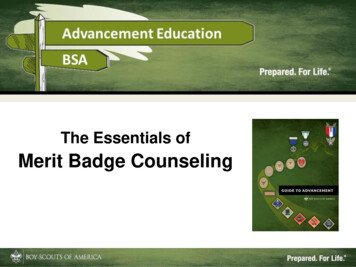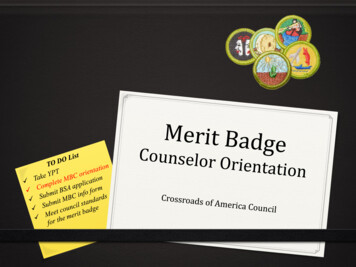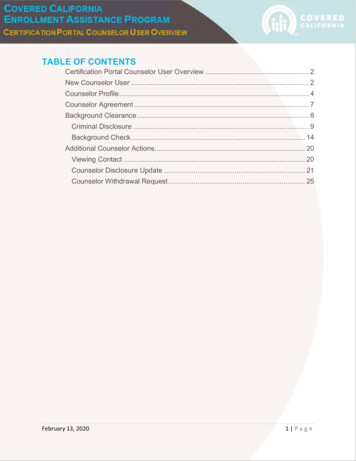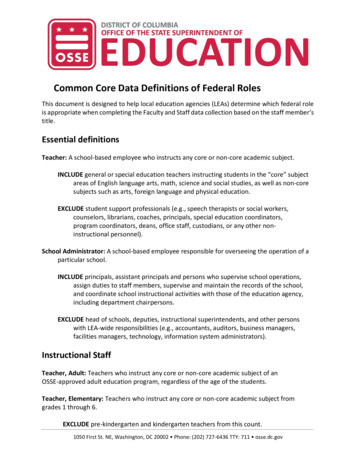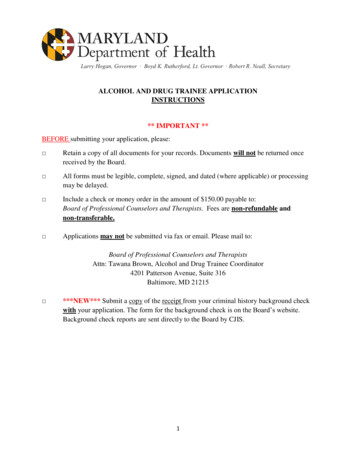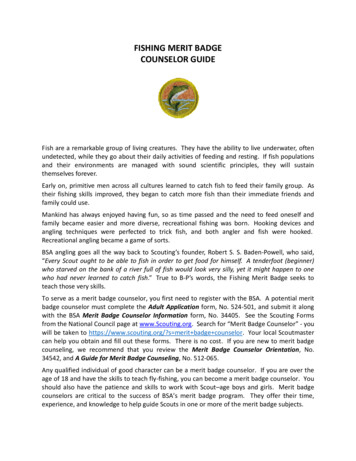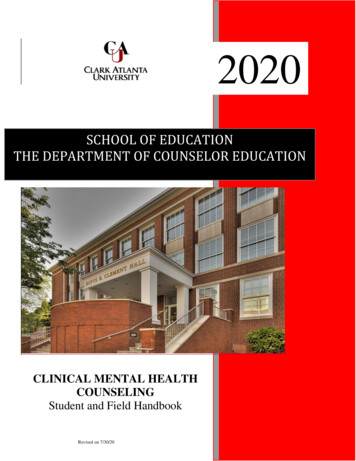
Transcription
2020SCHOOL OF EDUCATIONTHE DEPARTMENT OF COUNSELOR EDUCATIONCLINICAL MENTAL HEALTHCOUNSELINGStudent and Field HandbookRevised on 7/30/20
iTable of Contents1.0 Table of Contents . i2.0 Clark Atlanta University . 42.1 History . 42.2 CAU Mission . 52.3 CAU Vision . 52.4 Institutional Goals . 52.5 Clark Atlanta University’s Core Values . 72.6 Campus Cultural Creed . 72.7 Institutional Accreditation . 72.8 Program Accreditations .2.9 Program Accreditations . 83.0 School of Education . 83.1 School of Education. 83.2 School of Education Mission and Vision . 83.3 School of Education Theme . 93.4 School of Education Conceptual Framework . 94.0 Counselor Education . 104.1 Overview . 104.2 Counselor Education Mission and Vision Statement . 114.3 Program Goal and Objectives. 124.4 Counseling . 124.5 Master of Arts degree in Clinical Mental Health Counseling . 134.6 Endorsements . 134.7 Curriculum Objectives . 144.8 Program Prepares Candidates To: . 145.0 Clinical Field Placement . 155.1 Practicum and Internship Experiences . 155.2 Practicum Course . 155.3 Internship . 175.4 Internship Course . 175.5 Clinical Placement Guidelines . 175.6 Responsibilities and Commitments . 185.7 Candidate Responsibilities . 18Clinical Mental Health Counseling Student-Field Handbook
ii5.8 University'sResponsibilities. 185.9 University Coordinator Responsibilities . 195.10 University Supervisor Responsibilities 195.11 Site Supervisor’s Reponsibilites . 195.12 Guidelines for Supervision . 205.13 Candidate Disposition . 205.14 Remediation Plan . 205.15 Conflicts in Field Experience Placement . 205.16 Academic Process. 215.17 Dismissal from the Counselor Education Program . 21Appendices . 22Clinical field Checklist and Application Sample 23Clinical Site Affiliation Agreement Sample . 25Roles and Responsibility Agreement Sample 27Parental Release Form Sample . 29Client Release Form Sample . 30Daily Sign in Log Sample . 33Weekly Log Sample . 34Field Site Hours Completion Form Sample . 36Background Clearance Policy . 37ACA Ethical Standards . 41Glossary of Terms 57Handbook Aknowledgements . 59Clinical Mental Health Counseling Student-Field Handbook
iiiThe Department of Counselor Education Clinical Mental Health Counseling program isaccredited by:Clinical Mental Health Counseling Student-Field Handbook
iv2.0 Clark Atlanta University2.1 HistoryClark Atlanta University is a comprehensive, private, urban, coeducational institution of higher education with apredominantly African-American heritage. It offers undergraduate, graduate, and professional degrees as well ascertificate programs to candidates of diverse racial, ethnic, and socioeconomic backgrounds. It was formed by theconsolidation of Atlanta University, which offered only graduate degrees, and Clark College, a four-year undergraduateinstitution oriented to the liberal arts.The first President of Clark Atlanta University was Dr. Thomas W. Cole, Jr., who served concurrently as the President ofboth Atlanta University and Clark College prior to consolidation. In November 1987, after more than a year of discussion,the Boards of Trustees of Atlanta University and Clark College authorized an exploration of the potential advantages ofcloser working arrangements between the two institutions, including their consolidation into one university. In April 1988,the joint committee delivered its report titled Charting a Bold New Future: Proposed Combination of Clark College andAtlanta University to the Boards for ratification. The report recommended that the two schools be consolidated into asingle institution. On June 24, 1988, the Boards of both Atlanta University and Clark College made the historic decisionto consolidate the two institutions, creating Clark Atlanta University. The new and historic University inherits the richtraditions of two independent institutions, connected over the years by a common heritage and commitment; by personal,corporate and consortia relationships; and by location.Atlanta University, founded in 1865, by the American Missionary Association, with later assistance from the Freedman'sBureau, was, before consolidation, the nation's oldest graduate institution serving a predominantly African-Americancandidate body. By the late 1870s, Atlanta University had begun granting bachelor's degrees and supplying black teachersand librarians to the public schools of the South. In 1929-30, it began offering graduate education exclusively in variousliberal arts areas, and in the social and natural sciences. It gradually added professional programs in social work, libraryscience, and business administration. At this same time, Atlanta University affiliated with Morehouse and SpelmanColleges in a university plan known as the Atlanta University System. The campus was moved to its present site, and themodern organization of the Atlanta University Center emerged, with Clark College, Morris Brown College, and theInterdenominational Theological Center joining the affiliation later. The story of the Atlanta University over the nexttwenty years from 1930 includes many significant developments. The Schools of Library Science, Education, andBusiness Administration were established in 1941, 1944, and 1946 respectively. The Atlanta School of Social Work, longassociated with the University, gave up its charter in 1947 to become an integral part of the University. In 1957, thecontrolling Boards of the six institutions (Atlanta University; Clark, Morehouse, Morris Brown and Spelman Colleges;and Gammon Theological Seminary) ratified new Articles of Affiliation. Unlike the old Articles of 1929, the new contractcreated the Atlanta University Center. The influence of Atlanta University has been extended through professionaljournals and organizations, including Phylon and the National Association for the Advancement of Colored People, forboth of which Dr. W.E.B. DuBois, a member of the faculty, provided leadership.Clark College was founded in 1869 as Clark University by the Freedmen's Aid Society of the Methodist EpiscopalChurch, which later became the United Methodist Church. The University was named for Bishop Davis W. Clark, whowas the first President of the Freedmen's Aid Society and became Bishop in 1864. A sparsely furnished room in ClarkChapel, a Methodist Episcopal Church in Atlanta's Summerhill section, housed the first Clark College Class. In 1871, theClinical Mental Health Counseling Student-Field Handbook
5school relocated to a new site on the newly purchased Whitehall and McDaniel Street property. In 1877, the School waschartered as Clark University.An early benefactor, Bishop Gilbert Haven, visualized Clark as the "university" of all the Methodist schools founded forthe education of freedmen. Strategically located in the gateway to the South, Clark was founded to "give tone" to all of theother educational institutions of the Methodist Episcopal Church providing education for Negro youth. After the schoolhad changed locations several times, Bishop Haven, who succeeded Bishop Clark, was instrumental in acquiring 450acres in South Atlanta, where in 1880 (the institution relocated in 1883) the school conferred its first degree. Also, in1883, Clark established a department, named for Dr. Elijah H. Gammon, known as Gammon School of Theology, whichin 1888 became an independent theological seminary and is now part of the Interdenominational Theological Center.For purposes of economy and efficiency, during the 1930s, it was decided that Clark would join the Atlanta UniversityComplex. While candidates on the South Atlanta campus fretted over final examinations in the winter of 1939, work wasbegun across town on an entirely new physical plant adjoining Atlanta University, Morehouse College, and SpelmanCollege.During the 1980s some of the advantages of proximity, which had seemed promising earlier, again became evident. ClarkCollege and Atlanta University through consolidation preserved the best of the past and present and "Charted a Bold NewFuture." Clark Atlanta University was created on July 1, 1988. Dr. Walter D. Broadnax became the second President forClark Atlanta University on August 1, 2002, and Dr. Carlton E. Brown, our third President, assumed the presidency onAugust 1, 2008.2.2 CAU MissionClark Atlanta University is an institution of high research activity characterized by a focus on the intellectual and personaldevelopment of each candidate. Its purpose is to prepare a diverse community of learners to excel in their chosenendeavors and to become responsible, productive, and innovative citizen leaders, locally and globally. This outcome isaccomplished by the provision of access to and excellence in teaching, research, service, and creative activities throughcontinuous engagement in an enriched, challenging, and nurturing environment.2.3 CAU VisionClark Atlanta University will further extend its national prominence and international presence for its distinctive capacityand commitment to provide a personally transformative learning environment, characterized by excellence in teaching,rigorous and innovative academic programs, dedication to the nurturing and development of its candidates, and theconduct of research addressing critical local, national, and global issues. Its candidates and faculty will gather from allparts of the world to discover and apply solutions to many of society’s most pressing problems. Clark Atlanta Universitygraduates will demonstrate finely honed intellectual capability, innovative ideas and practices, inclusiveness, a dispositionto serve, and a distinct appreciation for diversity in people, place, and opportunity.2.4 Institutional Goals1. To enhance and maintain an environment which fosters intellectual, social and cultural curiosity and creativity,and the continuing development of morally sound value systems among candidates, faculty, administrators, andstaff.Clinical Mental Health Counseling Student-Field Handbook
62. To develop accelerated undergraduate and graduate degree programs, other new programs, and educationalexperiments using innovative ideas through research and teaching, both within and across disciplines, and inkeeping with the mission of the University.3. To increase the number of African-American faculty members who obtain doctoral degrees in the critical areas ofnatural and mathematical sciences, humanities, and social sciences.4. To implement a comprehensive approach for continuous academic program review and assessment to improvequality and determine resource requirements and new directions through a system of external visiting committees.5. To enhance the role of research with an improved research infrastructure and an evaluation system that recognizesthe importance of research and teaching to the mission of the University.6. To implement an integrated and centralized program for faculty and staff to address personal and professionaldevelopment.7. To continue to institute modern management techniques, taking into account the new information systems, theimprovement of human work environments, and the energy- efficient utilization of space.8. To build and maintain a vigorous institutional advancement and fund-raising capacity to provide the financialresources necessary to meet the University's goals.9. To continue to develop and implement a comprehensive candidate life program that will include both theundergraduate and graduate levels.10. To develop and implement more comprehensive public service programs, including opportunities for candidatesto participate in local, national, and international internships and work experiences.11. To implement a systematic plan for attracting a candidate body of increasing quality and size and an expandedacademic support system to improve candidate retention.12. To enhance and provide services to meet the education, cultural, and social service needs of the community bymaintaining ongoing linkages with other local, regional, national, and international institutions.13. To enhance the institution's commitment to provide education and technical assistance to other nations throughprograms, and to the furtherance of a university community that will be sensitive to the nature and depth of globalinterdependence.14. To provide a state-of-the-art telecommunication infrastructure using multimedia technology to facilitateexcellence in teaching, research, and service.Clinical Mental Health Counseling Student-Field Handbook
72.5 Clark Atlanta University’s Core ValuesUndergirding all of this “institutional cartography,” are Clark Atlanta University’s Core Values. This comportment isdefined by six, unwavering standards that benchmark the University’s culture:Core Values1.2.3.4.5.6.Candidate CenterednessPursuit of ExcellenceInnovation and DiscoveryIntegritySocial ResponsibilityRespect2.6 Campus Cultural CreedClark Atlanta University is committed to academic excellence, building character and service to others.The University will achieve its mission by cultivating an environment of honesty, kindness, mutualrespect, self-discipline, school loyalty, trust, academic integrity and communal pride. As a member of thisscholarly community, I make the following pledge:1.2.3.4.5.6.7.I will work to promote academic honesty and integrity;I will work to cultivate a learning environment which opposes violence, vulgarity, lewdness andselfishness;I will embrace the concept of mutual respect by treating others the way I want them to treat me;I will support a campus culture of diversity by respecting the rights of those whose views andexperiences differ from my own;I will honor and care for the sanctity of my body as the temple of God;I will commit myself to service so that I can make a difference in the world and a difference for morethan just myself;I will celebrate and contribute to the “spirit of greatness” left by those who preceded me and I willwork to leave this a better place for those who follow me.As a member of this community, I am committed to conducting myself in ways that contribute to a civilcampus environment which encourages positive behavior in others. I accept the responsibility to upholdthese noble ideals as a proud member of the Clark Atlanta University Family.2.7 Institutional AccreditationClark Atlanta University is accredited by the Commission on Colleges of the Southern Association of Colleges andSchools to award the Bachelor’s, Master’s, and Doctoral Degrees. Contact the Commission on Colleges at 1866 SouthernLane, Decatur, Georgia, 30033-4097 or call 404-679-4500 for questions about the accreditation of Clark AtlantaUniversity.Clinical Mental Health Counseling Student-Field Handbook
82.8 Program Accreditations Council for the Accreditation of Educator PreparationCouncil for Accreditation of Counseling and Related Educational ProgramsThe Georgia Professional Standards Commission3.0 School of Education3.1 School of EducationClark Atlanta University’s School of Education believes that every child, regardless of language, culture, ethnicity,perceived ability and/or circumstance, can learn. Moreover, we assert that they deserve an opportunity to maximize theirpotential.Every day, we prepare and challenge current and future educators to make that happen. Whether pursuing bachelor’s,specialist, master’s or doctorate degrees, our candidates are more than mere instructors, counselors, and school leaders,they are child advocates equipped with the knowledge, skill, and disposition to be change agents. That is our brand andour calling: we equip educators to transform the lives of all learners from preschool to high school graduation and beyond.Our degree programs include: Early Childhood Education Educational Studies Special Education - General Curriculum Secondary Math and Science Education Educational Leadership Clinical Mental Health Counseling School Counseling3.2 School of Education Mission and VisionMissionTo prepare highly competent, autonomous, critical-thinking, candidates for P-12 schools and various educational settingsserve all candidates, particularly those belonging to culturally and linguistically diverse groups.VisionThe School of Education will, consistent with the mission, vision, and core values of Clark Atlanta University, continue todrive and evaluate the discourse in seeking answers to societal problems and challenges endemic in local, national, andglobal scholastic environments.Clinical Mental Health Counseling Student-Field Handbook
93.3 School of Education Theme“Preparing Critical Thinking Change Agents to Improve Academic Outcomes in Diverse schools and Communities”3.4 School of Education Conceptual FrameworkThe School of Education infuses all curricula with understandings that recognize and develop the gifts and talents that allpersons bring to their respective program. The School identifies specific concepts: change agents for social justice,critical thinking and inquiry, assessment, pedagogy, diversity, content knowledge and technology-which undergird allcurricula and instruction. These concepts empower candidates to pass on the unit’s vision that is sensitive to underservedpopulations.Clinical Mental Health Counseling Student-Field Handbook
10Critical Thinking Change Agent OutcomesKnowledgeSkillsDispositionsK1. Critical Race Theory: Demonstrates the content knowledge of the cultural,historical, social, political and economic realities and uses such to foster optimaldevelopment for all candidates.K2. Multicultural Education: Demonstrates the basic and broad knowledge and criticalskills for culturally diverse groups to provide learning opportunities adapted to diverselearning needs.K3. Critical Pedagogy: Demonstrates how to teach subject content inherent ineffective teaching and/or learning.K4. Content Knowledge: Exhibits understanding and has knowledge of subject matterand how knowledge is constructed to improve candidate academic achievement ininclusive settings.S1. Communication: Demonstrates effective verbal and nonverbal communicationtechniques to facilitate active learning in the classroom or when working withcandidates, parents, colleagues and members of the community to promote candidatesuccess.S2. Technological: Incorporates technological applications to promote learning andensure educational equity.S3. Assessment: Systematically uses formal and informal assessment strategies toevaluate and assess teaching/learning issues in urban schools and communities.D1. Social Responsibility (Professionalism): Models ethical and professional behaviorsin all interactions with schools, families, and communities.D2. Cultural Sensitivity: Demonstrates respect for the learners’ communities andcultural norms and sees the learning potential in all candidatesD3. Advocacy: Views education as a dynamic political process in which to advocateimproving the educational system.4.0 Counselor Education4.1 OverviewThe Department of Counselor Education offers programs leading to Master of Arts degrees in clinical and mental HealthCounseling and School Counseling. Counselors must have a critical body of knowledge and set of skills to help clientsfunction effectively in their lives. To achieve this goal, the program offers a curriculum which includes the following corecomponents: human growth and development; counseling diverse populations; the nature of helping relationships skills;group counseling; career counseling; appraisal, research and program evaluation; ethics, and professional issues. Inaddition, course work specific to the clinical counseling specialization is required. Finally, field practicum and internshipexperiences are required to ensure that candidates can apply the skills and knowledge they have learned.The Counseling Program is also designed to make sure that the counseling candidate possesses the personal characteristicsnecessary to be an effective helper. This is accomplished through a multifaceted admissions process, the use ofexperiential learning approaches, and through the application of an ongoing screening of candidates’ personalcharacteristicsClinical Mental Health Counseling Student-Field Handbook
11Candidates receive skill preparation for direct service to clients; for diagnostic, consultative, and evaluative services; andfor preventive intervention. Possible employing agencies and institutions include mental health clinics and hospitals,corporations, governmental social agencies, public and private schools, community colleges, and correctional institutions.This major also prepares candidates for advanced graduate work at other institutions. A 700-hour clinical field placement isrequired.The Clinical Mental Health Counseling program at CAU meets the academic requirements for Georgia leading tolicensure as a Licensed Professional Counselor (LPC) and is accredited by the Council for the Accreditation ofCounseling and Related Educational Programs (CACREP).The practicum and internships are field-based experiences designed to provide candidates the opportunity to observe andparticipate in the actual processes involved in clinical counseling at varied mental health agencies. This handbook hasbeen developed to provide a more explicit liaison between the Clark Atlanta University Counseling Program and thevarious, institutions and agencies who voluntarily accept practicum and internship candidates. This handbook serves tocommunicate general information for students to matriculate in the program smoothly and to explain the procedures andrequirements relative to the field experience.4.2 Counselor Education Mission and Vision StatementsMission StatementThe mission of the Department of Counselor Education is to prepare candidates to assume roles of leadershipand service in society as Licensed Professional Counselors and/or certified School Counselors based on GeorgiaBoard of Professional Counselors, Social Workers, and Marriage & Family Therapists, the Council for theAccreditation of Counseling and Related Educational Program (CACREP) Standards, and the GeorgiaProfessional Standards Commission (PSC) and The Council for the Accreditation of Educator Preparation(CAEP).Vision StatementThe vision of the Department of Counselor Education is to prepare a diverse pool of candidates who areknowledgeable, critical thinkers, and ethical change agents, who promote a more just society. Graduates areprepared to counsel and foster change through counseling in collaboration with schools and communitystakeholdersClinical Mental Health Counseling Student-Field Handbook
124.3 Program Goals and ObjectivesUpon graduation from the CAU counseling program, graduates should meet the following objectives:1. Comprehend and adhere to professional ethical standards and identity, including: the history andphilosophy of the counseling profession, professional roles and responsibilities.2. Understand the uniqueness of human diversity and how it relates to the context of relationships, andissues in a pluralistic society.3. Understand and apply scientific processes, theory, and concepts to human behavior, human servicesystems and problems in human behavior at all developmental levels.4. Understand and integrate career theories, career decision making. Career planning and career assessmentin counseling through work at an agency or school.5. Understand and apply basic helping skills necessary for effective counseling and consultation withindividuals and groups in schools or agencies.6. Learn group theory and group practice as related to dynamics, counseling theories, group counselingmethods, and group approaches,7. Understand individual and group assessment approaches and their utility in a pluralistic society.8. Understand appropriate research methods (e.g., qualitative, quantitative, case study), statistical analysis,needs assessment and program evaluation methodologies, as well as ethical concerns for conductingresearch and evaluating research in a pluralistic society.9. Understand and use basic technology: PowerPoint, appraisal instruments, World Wide Web, e-mail, andMicrosoft Office Suite.4.4 CounselingThe American Counseling Association and delegates from 31 counseling organizations agree on a unified definition ofcounseling. That is:Professional counseling is a professional relationship that empowers diverse individuals, families, and groups toaccomplish mental health, wellness, education, and career goals. Also, counselors work with clients on strategies toovercome obstacles and personal challenges that they are facing.Clinical Mental Health Counseling Student-Field Handbook
13TYPES OF COUNSELINGINDIVIDUAL COUNSELINGIndividual counseling is a personal opportunity to receive support and experience growth during challengingtimes in life. Individual counseling can help one deal with many personal topics in life such as anger, depression,anxiety, substance abuse, marriage and relationship challenges, parenting problems, school difficulties, careerchanges etc.COUPLES COUNSELINGEvery couple experiences ups and downs in their levels of closeness and harmony over time. This can rangefrom basic concerns of stagnation to serious expressions of aggressive behavior. Marriage counseling or couplescounseling can help resolve conflicts and heal wounds. Overall, couples counseling can help couples slow downtheir spiral and reestablish realistic expectations and goals.FAMILY COUNSELINGFamily counseling is often sought due to a life change or str
College. During the 1980s some of the advantages of proximity, which had seemed promising earlier, again became evident. Clark College and Atlanta University through consolidation preserved the best of the past and present and "Charted a Bold New Future." Clark Atlanta University was created on July 1, 1988. Dr.
